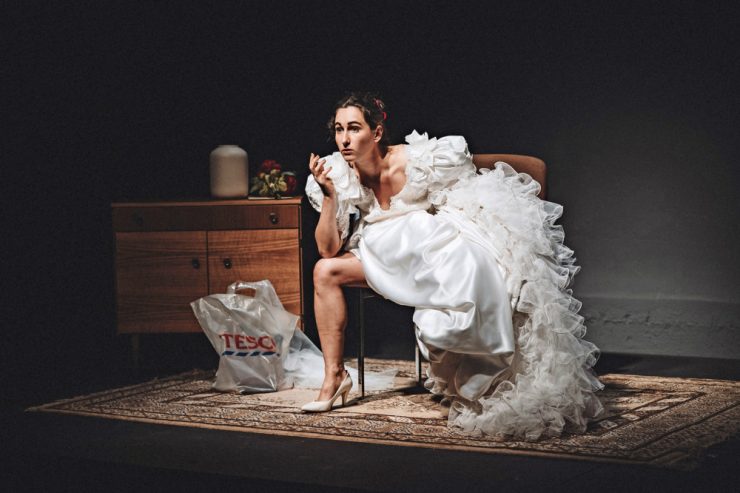It all starts with the projection of a video on sexual education as seen through the eyes of conservative Catholics (a pleonasm, I guess), who have to face the challenge of talking about procreation without giving away that having sex can actually be, well, beautiful, passionate, orgiastic – and perfectly divorced from its reproductive functions.
After an elderly bigot has explained how the man’s stiff penis deposits its sperm into the woman’s slippery vagina in a way that manages to take all the fun out of sex, a woman in a wedding dress appears on stage.
Grace Shaber, brilliantly played by Kristin Winters, shows up for the part of the bride in a casting. The male voice of the (casting) director, pre-recorded as all male voices turn out to be – Parulyte thus metaphorizing the infamous male gaze as invisible yet all-observing, almost totalitarian presences –, submits her to what resembles a police questioning, intruding into her personal life choices by asking her why she herself isn’t married and whether she doesn’t feel like „damaged goods“ because no one has thought about her as the right candidate for life.
The play then lets go off its metafictional frame and immerses the spectator in Grace’s life story, starting from her everyday routines of watching stupid sex education videos while getting wasted, fingering herself to sleep and swiping through tinder profiles while laughing at the vanity or the sheer stupidity of many a profile.
The way Grace browses through tinder – an application that has become, at least in Luxembourgish contemporary fiction, a very convenient narrative trigger –, reminds us of Elise Schmit’s „Under the Sun“, also produced by TNL. While Schmit’s meticulous taxonomy was hilarious in its deadpan, subdued way, Parulyte’s analysis of male profiles is more direct and crude, a bit less subtle and inventive.
Amidst all the mediocrity, there’s one profile that retains her attention: Oliver, a musician, who’s also a friend of a friend. After said friend has told her Oliver is „a nice guy“, she agrees to date him, thinking that even if things will go wrong, she’ll at least „end up in his lyrics“.
Hideous men

And wrong they go, things, as Oliver turns out to be the typical self-centred male, whose own dysfunctional family is more important than her pervy stepfather or her passive mother, who doesn’t want her to show up at parties but still insists on her cooking a curry in the most misplaced of contexts and who’ll react, after she left him a letter confessing a terrible return of a repressed trauma, in a shockingly self-centered way that would fit one of the characters of David Foster Wallace’s „Brief Interviews With Hideous Men“.
As in almost every recent Luxembourgish production that tackles love, Haddaway’s „What is Love?“ appears prominently, although it has, in Parulyte’s play, a terrifying semantic legitimacy, the writer-director and her character later going on to analyse, with the assistance of Grace’s shrink, the lyrics of seemingly strong women in (more or less) contemporary pop music, realising that the likes of Tina Turner, Whitney Houston or Beyoncé mainly sing about „not being able to be without the man that treated them like shit“ – although the mourning of a cruel lover might very well be a pop-music-trope encompassing all and everyone.
In her direct and self-critical monologue, Grace addresses male dominance and self-delusion (she interprets the fact Oliver doesn’t use a condom as a sign of trust and love), sexual abuse and how she (doesn’t) cope(s) with it, gender and violence: „Women’s biggest fear is violence, men’s biggest fear is humiliation, and men tend to react to humiliation with violence“, these three premises constituting a syllogism whose conclusion can only translate as a circle of violence.
In one of the most poignant and honest moments, Grace sees how we all drown our sorrow in different addictions, how we all are „wounded children of wounded children“. Here, Parulyte should have pushed the recursiveness of generations further down and insist on the impact of collective historical trauma: this is where the play misses out on the opportunity of broadening its subject matter and escape from its autofictional frame.
Circles of violence
Grace’s monologue gets interrupted in three different ways: by moments of dialogue with male off-voices, incarnated by the holy trinity of the Casting Director, the Priest and the Shrink, by documentary intermezzi and through a scene during which the actress breaks the fourth wall and addresses the audience, highlighting the play’s delicate dramaturgy (Liv Morris and Florian Hirsch).
Thus, „Lovefool“ intersperses its monologue with elements of documentary theatre. On two occasions, Grace’s monologue stops, the stage blackens and a multilingual chorus of voices weave into each other: First, there are the naive comments of children trying to answer the question of what qualities a „good woman“ should possess, the kids reproducing misogynistic clichés – a good woman should be able to clean and to cook, should be soft or take good care of people – that they must have absorbed at home or at school, on television or the Internet (Parulyte showing how social conditioning almost starts when you’re a toddler – and how quickly and efficiently it takes hold).
As Althusser has put it: There’s no being outside of ideology, because we’re all born into it. To complete the picture and to open it up to comparison, it would however have been interesting to see what those same children’s view of a good man would be.
Later on, as if echoing this first documentary intermezzo, several women are asked what they wished their father had done differently – the result is a panorama of male violence and deficiency.
Finally, there’s several instances of breaking the fourth wall, the metafictional setting of the play allowing for an easy back-and-forth between immersion and breaking points. The most interesting part shows Grace addressing the audience, asking it a series of disturbing questions – Who would have wanted to lead a different life? Who has experienced sexual abuse or knows someone who has? Who has had suicidal thoughts or knows someone who has committed suicide?
If the idea is daring and its execution overwhelming – while Winters takes several steps towards the audience and lets the public in doubt whether she is in or out of character, the lights get brighter and illuminate the audience, exposing our reactions –, the questionnaire itself seems flawed, as if Parulyte was reluctant to go through with the radicality of its formal procedure. Thus, asking if someone has had suicidal thoughts is a whole different thing than asking whether that same person knows someone who has committed suicide.
With Grace finding out that learning how to respect and love yourself is of the utmost importance, the play’s conclusion might seem a tad banal and as obvious as the pieces of advice contained in AA’s Twelve-Step-Program – but as David Foster Wallace has put it in several of his fictions and essays, we very often hide these simple recognitions under layers of cynicism we hardly ever manage to extract ourselves from. If Parulyte and her excellent actress find beauty in those simple truths, this last epiphany also shows that the play could have done away with some of its pseudo-provocative moments – the final „fuck off“ somehow sounding more rebellious than it really is.
„Lovefool“ runs at TNL at 20.00 h tomorrow as well as on the 7th and 8th December.

 Zu Demaart
Zu Demaart








Sie müssen angemeldet sein um kommentieren zu können